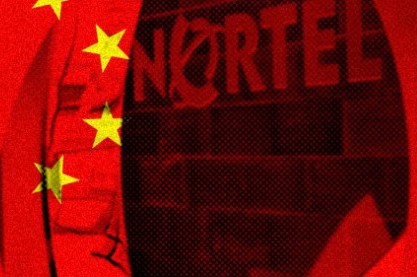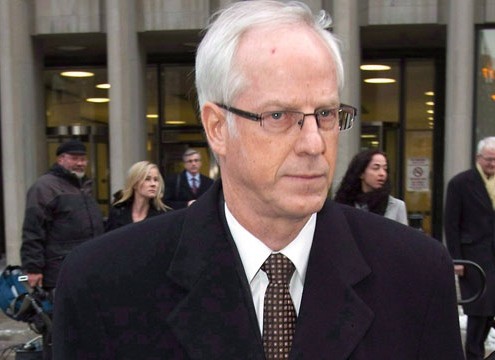Recent events in the United States have brought new scrutiny upon an issue that may render the Nortel fraud trail a minor sideshow, and could forever change the company’s tarnished legacy.The dark cloud of Nortel has hung over the Canadian tech scene for a decade.
The fraud trial of ex-CFO Douglas Beatty, ex-CEO Frank Dunn, and ex-controller Michael Gollogly is scheduled to wrap up in January and will determine whether the trio cooked the books in 2002 and 2003 to trigger large bonus payments for themselves. Many expected this would be the last we would hear about the former telecom giant before the company shrank into infamy.
Recent events in the United States, however, have brought new scrutiny upon an issue that may render the fraud trail a minor sideshow, and could forever change Nortel’s tarnished legacy.
Last week, the US House Intelligence Committee said that after a yearlong investigation, it had concluded that Huawei Technologies and ZTE Inc. are national security threats. At a press conference on October 8th, Michigan Representative Mike Rogers, the chairman of the House Intelligence Committee, said the US government should be barred from doing business with Huawei and ZTE, and American companies should not deal with them. Rogers said that when the US government launched the investigation, which was actually at the request of Huawei, what they found was perplexing.
The company, he said “….refused to provide full and transparent answers to our questions. Apparently, to turn over internal corporate documents would potentially violate China’s state secret laws. Strange that the intended corporate documents of a purportedly private sector firm is considered classified secrets in China. This fact alone gives us reason to question their independence. ”
The investigation south of the border has sparked a fresh round of fear about Huawei’s activities in Canada, where it has been aggressively expanding its operations. Early in 2012, Huawei opened a massive Canadian headquarters in Markham to pair with its existing Ottawa R&D center. The company already supplies equipment to Bell Canada, Telus and SaskTel, and was purportedly in the running to help implement a comprehensive government communications network.
______________________
This story is brought to you by Serenic (TSXV:SER). Serenic’s cash position as of May 31st, 2012, $4.45-million, was greater than its market cap as of September 6th, which was $3.86-million. The company has zero long-term debt. Click here for more info.
_______________________
This, says one expert, would be a huge mistake.
Brian Shields, a network security investigator for Nortel was on the CBC radio program As it Happens last week with hosts Carol Off and Jeff Douglas. Asked if Canadian telecoms are putting themselves at risk of sabotage if they partner with Chinese firms, Shields was unequivocal.
“Without a doubt” he said. Shields says he discovered that Nortel was being hacked for more than a decade. So who was behind the attacks?
“There is no doubt in my mind it was the Chinese government” he said, echoing Congressman Rogers’ assessment that Huawei simply could not operate independently of the communist Chinese government. Shields says it is no coincidence that the rapid decline of Nortel coincided with the meteoric rise of competitor Huawei.
“Whose light was shining bright on the horizon?” he asked rhetorically. “While Nortel was in a decline mode for eight or ten years, who suddenly was doing very well? The facts speak for themselves. Huawei was doing very well.”
How much of this contributed to the downfall of Nortel? queried Off.
“It was the majority of the problem.” replied Shields.
Michel Juneau-Katsuya a former senior intelligence officer and manager at the Canadian Security Intelligence Service, appearing on the same program, said that organization has accumulated a great amount of evidence that there is a “dangerous” relationship between the Chinese government, the Chinese military and Huawei.
Juneau-Katsuya says that CSIS has suspicions that all of Nortel’s intellectual property was stolen after it began to do business with Huawei.
At its peak, in 2000, Nortel had a market value of $350 billion. The stock once represented 36% of the entire value of the Toronto Stock Exchange and employed 90,000 people.
The seemingly endless downward spiral of Nortel actually began on October 25, 2000, when CEO John Roth warned, for the first time, that the company would not meet its sales targets. Shares of Nortel fell from $96 to $71 that day. By 2002, half of the company’s 90,000 workers had been laid off. And then it got worse. Debt downgrades, missed reporting deadlines and financial restatements killed a meager rally in the stock. Nortel declared bankruptcy on January 14, 2009.
Meanwhile, the degree to which Chinese espionage in the technology sector had infiltrated the Western World was still an unfolding story. Last week, Cisco ended a relationship with ZTE that went back to 2005 after it found that the Chinese manufacturer sold banned technology to Iran.
Since 2000, the legacy of Nortel has been framed in terms of incompetence and mismanagement and sometimes used as evidence that Canada has no place in the world of technology. That Nortel may be a mere footnote in a more nefarious and unresolved political potboiler is cold comfort to a generation of Canadians who value the rich technology heritage of a country that gave the world the telephone, the light bulb, and insulin.
But legacies do matter. Today, the legacy of our largest ever tech employer deserves to be, after a dozen years of shame, a matter of serious national reflection.
Related: Terry Matthews: Nortel is Gone, Here’s How we Get Over It
________________________
________________________
Comment
One thought on “Will allegations against Huawei forever change Nortel’s legacy?”
Leave a Reply
You must be logged in to post a comment.






 Share
Share Tweet
Tweet Share
Share




“At its peak, in 2000, Nortel had a market value of $350 billion. The
stock once represented 36% of the entire value of the Toronto Stock
Exchange” This in itself should have been one hell of a warning sign that this company was headed for a crash. Yes the Chinese may have stole all the intellectual property but there were a lot of other things wrong with Nortel – financial problems technical problems, management problems, problems with internal controls including controls to protect their intellectual property just to name a few. And what has Canada done in the high tech world since Nortel? Gone from bad to worse IMO – just look at RIM. Sad is all I got to say!!!